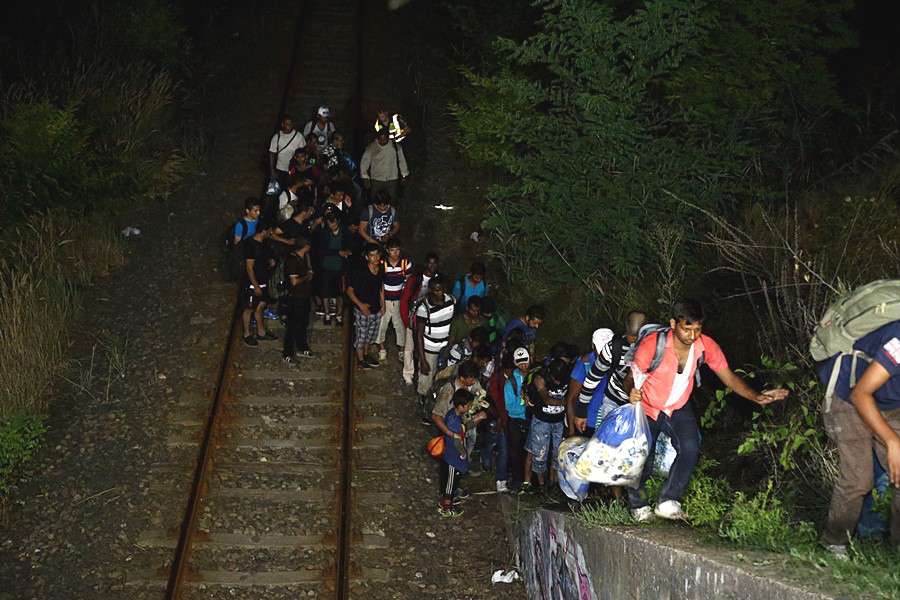The challenging opportunity of migration: can CSOs strengthen their role?

The consensus on the implementation of the international rights of refugees and asylum seekers is apparently shared by the institutional levels of all countries, and there is agreement on the long-lasting, historical features of the process when speaking of the massive flows of migrants moving nowadays to Europe. But, the actual commitment of the States, including in the Western Balkan region, mostly focuses on setting-up barriers and clearing the countries of the presence of newcomers.
Notwithstanding the demographic decline due to brain-drain and economic migration from the WB region, there are few planned actions aiming to take advantage of migrants’ potential contribution in the recipient societies. The issue of a smooth integration of migrants, also along transit routes such as those in the WB countries, is prevalent in the international debate but still inadequate in national policy making.
Even now, the numbers of people wandering across Europe and the Balkan region remain high beyond emergency levels, and create the challenge of how to connect assistance with development.
The new mantra of resilience in the local communities impacted by the sudden influx or the planned hospitality of hundreds, if not thousands, of migrants implies high sensitivity in terms of awareness of human rights protection and full knowledge of the cornerstones for building local development capacity. Therefore, to bridge the means in the responsibility of public administrations and the behaviours of dwellers bewildered between disappointment and solidarity is a playground where civil society organisations are expected to play a further pivotal role in setting higher levels of civilization and welfare. The CSOs can be main actors for feeding the resilience capacity of recipient communities provided that:
- Central planning of the allocation of migrants takes care to balance the needs of inhabitants and of those in need of shelter;
- Intercultural relations are aided by facilitators with professional skills;
- The media is supportive and helps avoid political hostility;
- Organised identification and utilisation of migrants’ skills for social and economic activities is in place.
The opportunity to investigate the experience of the CSOs of the Western Balkan region and multiply their possibilities to network with sister organisations of the countries participating in the Berlin Process is being supported by the workshop organized by the Central European Initiative as part of the CSF Trieste. This is rooted in the campaign co-financed by the CEI Cooperation Fund since 2015 for facilitating the exchange of experience and for taking stock of results and competences achieved by the public and civic actors of its 18 Member States and beyond.
There is a relationship between the outstanding role of the local CSOs in dealing with the migration flows in the Balkan region since 2015 and the evolution of their organizational features and positioning in the institutional framework of each country. Hence, we should build on this experience and suggest regulatory improvements at the central and local decision-making levels. This is particularly due for matching the request for longer-term commitment to pave the way to the decentralized territorial inclusion of incoming people in medium-sized towns or rural communities.
Since the CSOs played a pivotal role in providing services in emergency conditions, they also fine-tuned their capacity of independent fund-raising and bargaining with public institutions. Did the experience of these years change the features and the priorities of the CSOs, pushing them to develop their skills into becoming agents of new social entrepreneurship? And did the interaction between CSOs and local authorities generate new consultative mechanisms suitable for becoming a benchmark for improving the legal framework of the Public-Private Partnership (PPP) in the WB Countries? An affirmative answer to these questions would strengthen the presence of the CSOs at the local level, as already happened during the crisis along the Balkan Route. The CSOs forged an alliance with the media for enhancing the culture for integration of the migrants at the national and local level and for feeding the WB debate on ways to harness the potential benefits of immigration beyond the apparent counteraction of the current brain drain and unemployment with the influx of migrants.
Building consensus in the public opinion at large and among local dwellers is the key to sound migration management.
Where assistance to the newcomers is well-organized through the mobilization of the civil society and its organisations, fears and hostility are reduced and can actually be converted into active friendly reception and integration.
Ugo Poli, leader of the CEI Focal Point Migrations. Since 2012, he has worked as a project manager at the CEI Secretariat, and is also familiar with ETC projects and EU macro-regional strategies
